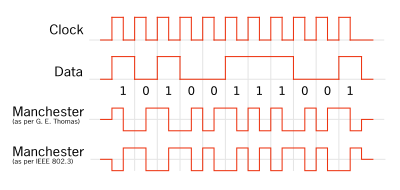Manchester code
The Manchester code is a binary encoding which also encodes the clock signal. This is very useful, because an external clock signal is no longer needed. A sequence of bits modulates[disambiguation needed] the phase of the signal. This is a form of Phase shift keying, often shortened to PSK.

Otherwise put, the information about the signal is in its signal flanks, that is when the signal changes.
Manchester codes are widely used, for example for Ethernet or for RFID.
Representation
changeThere are two ways to represent a Manchester code:
- A falling signal flank represents a logical 1 and ascending flank is a logical 0. This is the original definition given by G.E. Thomas
- A falling signal flank is a logical 0, the ascending one a logical 1. This is the definition used by the original Ethernet standard.
To rule out ambiguities, Manchester codes use a preamble. A preamble is a fixed sequence that is known beforehand.
Advantages and disadvantages
changeOne of the advantages of Manchester code is that the DC component of the signal carries no information. This makes it possible that standards that usually do not carry power can transmit this information. One of the drawbacks of the encoding is that it needs more bandwidth than other encodings, such as NRZ.